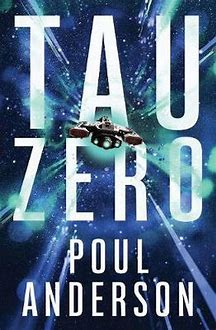Into Deepest Space by Fred and Geoffrey Hoyle
Tau Zero by Poul Anderson
Faster Than Light
The Triumph Of Time by James Blish
World Without Stars by Poul Anderson
We notice that:
intergalactic travel is rare in sf;
as ever, Anderson covers every angle or, in this case, both angles;
but it is Blish that cites an idea yet to be developed any further.
During an intergalactic voyage:
"Even the tenuous bridges of stars which connected the galaxies like umbilical cords - bridges whose discovery by Fritz Zworkyn in 1953 had caused a drastic upward revision in estimates of the size and age of the universe - provided no relief of the black emptiness..."
-James Blish, The Triumph Of Time IN Blish, Cities In Flight (London, 1981), pp. 467-596 AT CHAPTER SEVEN, p. 577.
We remember the Leonora Christine traversing the vast empty spaces between groups of groups of galaxies in Tau Zero. However, neither Anderson nor the Hoyles mention bridges of stars between galaxies. Could these "bridges" be used as bridges? Blish said in conversation that, on the one hand, an intergalactic journey along any such bridge should not be any quicker than travel by a direct route but, on the other hand, there must be some way that the bridges of stars could be worked into a story.
An ideal challenge for Poul Anderson or, in his absence, who else?

1 comment:
Kaor, Paul!
It bears pointing out Anderson was not quite satisfied with TAU ZERO, even if most readers were happy with it. Deadline pressure by a publisher forced him to turn in a text before he believed TAU ZERO was ready for that.
I think Anderson's later book STARFARERS gives us better speculations about what life in a STL star ship could be like. Stirling's comments about it reminded me of how important it will be to select the crews of such ships very carefully. Anderson showed us the dangers arising from several members of the "Envoy's" crew being unfit for long STL journeys.
As for successors of Anderson in the writing of hard SF, I've seen good things said about a writer named David Weber, but I've yet to read any of his books.
Ad astra! Sean
Post a Comment